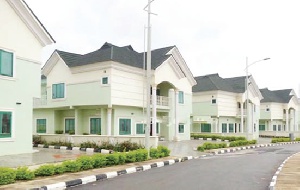Long-term funds could drastically reduce the cost of mortgages, Head of Commercial Banking at Stanbic Bank, Abdul-Jaleel Hussein, has said, urging his peers in the banking industry to innovate in that regard.
“For decades, finance institutions have used short-term funds to finance real estate activities, which leads to the high cost of mortgages or prices of houses in the market,” Mr Hussein said ahead of Standard Bank’s Trans-Regional Conference slated for October.
To reverse the trend, he recommended that banks enter into partnerships with development finance institutions, including the International Finance Corporation (IFC), to gain access to long term capital that can be on-lent to the real estate sector at moderate rates.
From 1.2 million units, the country’s housing deficit rose to 1.7 million units in June 2013, forcing the annual demand for houses to also firm up to 100,000 units.
Although the deficit has attracted a record number of estate developers and ancillary service providers into the real estate business, the number of houses supplied per annum is still at 60 per cent - 60,000 units.
"Banks would have to look for cheaper sources of financing, which they can lend to developers at comparatively lower rates," said Mr. Hussein, who is also a Chartered financial analyst.
As a long term product, Mr. Hussein said, mortgages need to be funded by corresponding long term funds, which are unfortunately not available in Ghana.
"Because of that banks are left with short-term funds from depositors to use in financing long term projects. So, banks will now have to look at partnering with development agencies such as the IFC and Africa Development Bank (AfDB) because they are able to assist with that. They offer banks very cheap source of long term funding, which they can on-lent to targeted groups of people."
The upcoming conference, organised by Stanbic Bank Ghana’s parent company, is aimed at exploring investment opportunities in the sub-region, including those in the real estate sector, which is bedeviled with ineffective demand in the country.
With most Ghanaians spending a minimum of 43 per cent of their incomes on consumption related expenditure, Mr. Hussein said not much was left for capital investments, including mortgage.
As a result, he said banks needed to enter into credible partnerships with developers and off-taker institutions to ensure that houses delivered are accessible by those in need of them.
He also mentioned the need to revamp the local housing inputs sector to serve as a cheaper alternative to the pricy imports.
Currently, about 70 per cent of inputs, including ceramics, are imported, making it difficult for developers to control the cost of their final products - the houses.
Government, Mr. Hussein said, could partner the private sector to help remove this bottleneck by encouraging investments in the value chain.
He, therefore, welcomed efforts by some Chinese investors to establish a ceramics factory, explaining that the initiative, if realised, could help reduce the cost of houses.
He also mentioned tax waivers for developers who use local products, easing of the challenges associated with land acquisition, as some of the interventions the government could use to bridge the housing deficit.
"It is important that there are targeted interventions from government to make sure that the cost of development is reduced. If that happens, the prices of houses will reduce,” he said. "It cannot be a blanket thing; it has to be targeted at areas that the housing deficit is pronounced."
Business News of Wednesday, 28 September 2016
Source: B&FT













